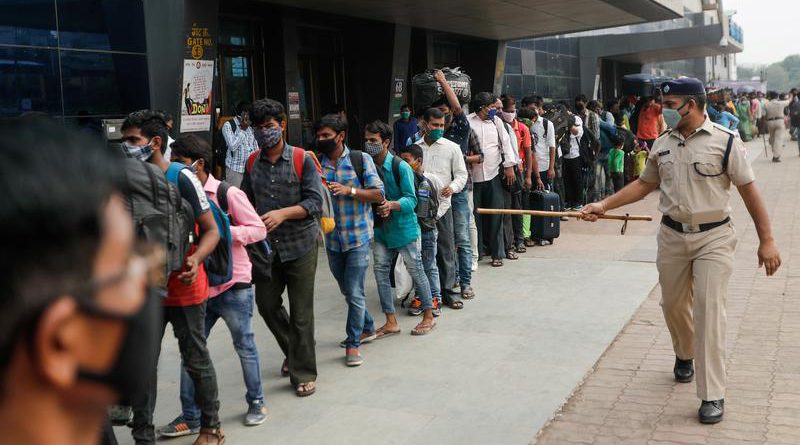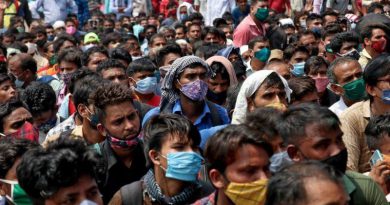India bans Remdesivir exports as coronavirus rages on; rallies continue
New Delhi (Reuters) – India on Sunday banned the export of anti-viral drug Remdesivir and its active pharmaceutical ingredients as demand rocketed due to a record surge in COVID-19 infections, leading to a crippling shortages in many parts.
Authorities have blamed the ferocious resurgence of the virus mainly on crowding and a reluctance to wear masks.
Still, religious gatherings have continued and Prime Minister Narendra Modi and Home Minister Amit Shah have themselves addressed election campaigns attended by tens of thousands of people, many without masks and hardly any following social distancing.
As new COVID-19 cases surged to 152,879 on Sunday, the sixth record rise in seven days, harried relatives of patients made a kilometre-long queue to buy Remdesivir outside a big hospital in the western state of Gujarat, witnesses said.
India, known as the pharmacy of the world, has already stalled major exports of coronavirus vaccines though its supply too has run short in some states of the country.
In addition to the Remdesivir ban “till the situation improves”, the health ministry said that manufacturers had been asked to step up supplies.
Seven India-based companies have licensed the drug from Gilead Sciences, with an installed capacity of about 3.9 million units per month, for local use and exports to more than 100 countries.
The companies are: Cipla, Dr. Reddy’s Laboratories, Hetero Labs, Jubilant Life Sciences, Biocon’s Syngene, Zydus Cadila Healthcare and the Indian unit of Mylan.
The World Health Organization in November issued a conditional recommendation against the use of Remdesivir in hospitalised patients, saying there was no evidence that the drug improved survival and other outcomes.
But many countries, including India, have continued its use.
India leads the world in the daily average number of new infections reported in more than two weeks, accounting for one in every six infections reported globally each day.
Deaths have also surged, with the health ministry reporting 839 fatalities on Sunday – the highest in more than five months – taking the total to 169,275.
India’s tally of more than 13.35 million cases is the third-highest globally, behind the United States and Brazil. India’s new infections have soared nearly 18-fold since hitting a multi-month low in early February.
Black Marketing
Some state governments have in recent days raised concerns over hoarding and black marketing of Remdesivir, which in some instances is being sold at over 10 times the maximum retail price.
“Pharmacists and stockists might be doing black marketing and that needs to be checked,” Rajesh Tope, health minister of India’s hardest-hit Maharashtra state, told reporters this week.
Maharashtra and many other states have also demanded more vaccine doses. India has administered more than 100 million doses since mid-January, the most after the United States and China, but much lower than many countries per capita.
The federal health ministry has asked Maharashtra, home to India’s financial capital Mumbai, to improve COVID-19 testing and deploy more manpower.
“Rostering of health care workers, hiring of contractual health workers need to be expedited,” India’s health secretary said, flagging an acute shortage of healthcare workers in seven districts of Maharashtra.
Thousands of people thronged the banks of the holy Ganges River in Haridwar city on Sunday for prayers during the Kumbh Mela – where up to five million are expected on certain days.
Authorities have made it mandatory for all people entering the area to take COVID-19 tests. But many devotees on Sunday gathered by the river without masks, in densely-packed crowds.



